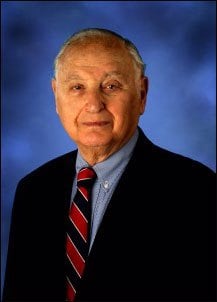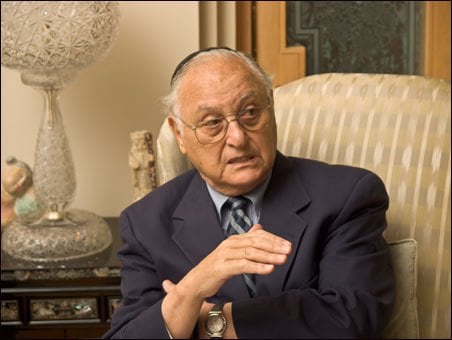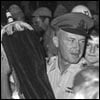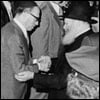
To date, Avner was a footnote in history, as is the case with most political aides. His new volume is poised to change that.
It was only recently that the ambassador realized that in his possession was "a treasure trove," Avner told me an interview. However, it took him more than fifteen years to write this volume that reveals some of what happened behind the scenes.
At the end of each of the meetings at which he was present – whether internal meetings with Israeli politicians or with foreign dignitaries and heads of state – he transcribed the minutes for the official record. His secretary would then type up the notes and "I would stuff the scribbles in a drawer," he says.
"I saw this vast quantity of authentic exchanges, most notably with [political figures from] the United States. I realized that I had the making of book."
I learnt why everyone came to see the Rebbe; he knew things, even things Rabin did not know. However, as I point out in my book review, the volume does not fully inform the reader as to the Ambassador's personal opinions. At the events that he records in the book, Avner explains, he was just "the proverbial fly on the wall. I took out [moments from the meetings] to communicate to the readers various episodes which were emblematic of the day of the prime ministers who had to handle these episodes under great stress.
"I tried to be in the shadows all the time, it is not about me, it is about them."
As was the case with many, if not most, Israeli leaders, Avner had several personal audiences with the Rebbe, Rabbi Menachem Mendel Schneerson, of righteous memory, and he records some of those meetings in his new volume (excerpted here). While I also used the interview to quiz Avner about his relationships with the Israeli Prime Ministers, I mostly focused on his relationship, and the relationships of the Prime Ministers from whom he worked, with the Rebbe.
Here are excerpts from the interview.
What were Ambassador Yitzchak Rabin's [read The Rebbe and Rabin] impressions from his meeting with the Rebbe?
My first yechidut [private audience with the Rebbe] was when I was working with Yitzchak Rabin; he was then the ambassador [to the United States]. Our president, Zalman Shazar, who was a "Lubavitcher," requested that the ambassador should congratulate the Rebbe on his seventieth birthday. [Rabin] was very hesitant. Eventually, however, I succeeded in persuading him [to go]. We drove up to 770, a battery of pressman taking photographs. People were trying to break down the door to get into the [waiting] room. Rabin sat there with his bar mitzvah yarmulke [skullcap] perched on his head like an alien in a foreign land.
In the car on the way back, Rabin told me, "It was a very substantive discussion, I have just met one of the greatest people of our people, he knows more about Israel than most of the members of our Knesset."
I was very sensitive to this extraordinary meeting, Rabin, totally secular, meeting for the first time in his life a sage of our people, the greatest of the 20th century. I was tremendously intrigued at the way the Rebbe put him at ease, to be himself.
The Rebbe was able to weave into this discourse not only theological ramifications, but also political, diplomatic insight.
I was sitting there and I was totally captivated by the Rebbe.
From this I learnt why everyone came to see the Rebbe; he knew things, even things Rabin did not know.

Do you remember the visit of President Zalman Shazar as President of Israel?
It was on Purim eve that I went with Shazar [to the Rebbe]. [Prime Minister] Golda Meir was not happy [that he was going to the Rebbe, as opposed to the Rebbe coming to Shazar in his hotel]. "What does Golda understand about these things, I am chassid of the Rebbe," Shazar told me.
In fact, later on I learnt that Golda Meir did know what Chabad was. I had a conversation with Golda Meir once about Chabad after she told me the story of her first meeting with Moscow Jews.
[Gold Meir told this story to Avner, as recorded in his new volume:
Let me tell you a story. It was 1948, in this season of the year, I arrived in Moscow as Israel's first ambassador to the Soviet Union. The State of Israel was brand new. Stalinism was at its height. Jews as Jews had no rights. They had been cut off from their fellow Jews for thirty years, since the communist revolution of 1917. Stalin had proclaimed war against Judaism. He declared Zionism a crime. Hebrew was banned. Torah study was banned. One was sent to the gulag or to Siberia for far less.
The first Shabbat after I presented my credentials, my embassy staff joined me for services at the Moscow Great Synagogue. It was practically empty. But the news of our arrival in Moscow spread quickly so that when we went a second time the street in front of the synagogue was jam-packed. Close to 50,000 people were waiting for us.]
I asked her how the word got out. She responded, "The Chabad underground had spread the word."
It was during the years of Prime Ministers Begin's visit that it seems you became one of the Prime Minister's liaisons to the Rebbe...
I met the Rebbe, of saintly memory, four times. The last one for four hours; shortly after that I was appointed ambassador to London. The yechidut was at the request of the Prime Minister. It was from 10:15 at night to 2 in the morning.
When Begin was in the opposition he would come to New York, and he would often visit the Rebbe; they were very good friends. When he was Prime Minister and we were planning his first trip to the United States, I asked him who he would like to meet other than the President of the United States; he told me, "Give me time to meet the Rebbe."
You could read all about that visit in two chapters of the book.
At some point, the Rebbe's and the Prime Minister's opinions differed…
The Rebbe was against [the] Camp David [accords]. Begin sent me several times to explain to him Camp David. However, the Rebbe was not persuaded that Camp David was the right thing to do.
When the peace treaty with Egypt was signed, there was going to be gradual withdrawal from Sinai. Every time we reached a phase, I would sit with the Rebbe to explain and we would look at the ramifications. I remember once the Rebbe was speaking to me about the US Navy sixth fleet, if it is wise to give them port facilities in Haifa. I am not in position to disclose the advice that the Rebbe gave, it was done in the strictest discretion. The time has not come to tell the full tale.
Did the Rebbe's admiration for the Prime Minister end after Camp David?
Not at all, he was too big a man. His personal relationship soared high above the views of Begin. In fact, the Rebbe taught all of his followers that one's views should not sour relationships.
Why do you think it was important for Begin to solicit the Rebbe's opinion?
Begin wanted to hear the dvar torah [the approach of Torah] and the dvar halachah [approach of Jewish law]. It was important for Begin to hear this viewpoint.
Why did the Rebbe have interest in giving an opinion on what was happening in Israel? Would you say the Rebbe had political ambitions?
If by "political ambition" you mean to go into politics, he was above it all. The Rebbe would not know what those two words meant. All the Rebbe was about was education, and we did speak a lot about education. Another subject that I do not have the liberty to discuss what the Rebbe said.
As part of that, Eretz Yisroel [the land of Israel] was very important to him, because he well understood that Israel was to many Jews the sole definition of being Jewish. To the Rebbe it was Eretz Hakodesh [the Holy Land]. The Rebbe fanatically cared about the security of the Jewish nation.
As you could read in the book, the Rebbe said to me what his mission was. I understood that he wanted to extend a helping hand to all those that needed assistance, those who needed a guide, those who were looking for advice.





